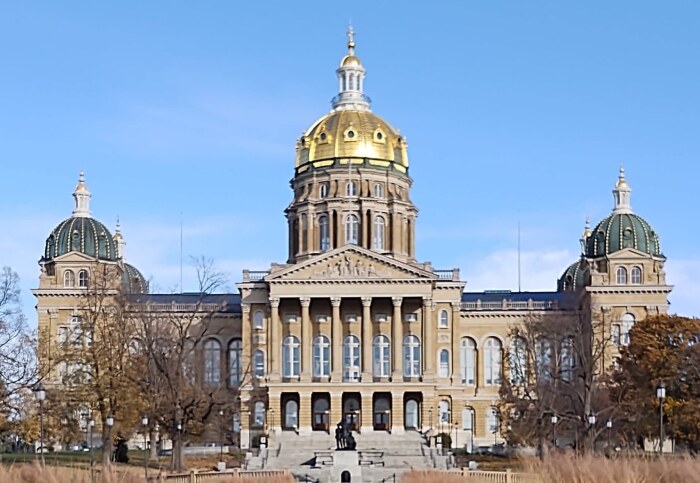Doris J. Kelley is a former member of the Iowa House and former Iowa Board of Parole Chair, Vice-Chair and Executive Director.
When former Republican Governor Terry Branstad signed executive order 85 in March 2014, he stated, “transparency provides Iowans the necessary access to information to hold our government accountable and our Open Records Act is essential to ensuring openness,” adding, “Our administration has maintained a steadfast commitment to a transparent government.”
Branstad held weekly press briefings to answer journalists’ questions.
However, when Kim Reynolds became governor in 2017, a few months after Republicans gained full control of the legislature, transparency went out the window. Accessing many kinds of government data has become more difficult.
Iowa’s open records and open meetings laws were designed to provide transparency. Any official of any organization that receives taxpayer funds must make it easy for the public to know the decision-making process and/or make data easily accessible when requested. “Ease” and “easily” are the key words; not burdensome . . . not in secrecy . . . and not hidden.
The lack of transparency examples by Reynolds, GOP legislators and agencies under Reynolds’ leadership seem to be unending.
Reynolds has not revealed the reasoning behind her $55 million private school voucher proposal, which would benefit just 2 percent of Iowa’s school children but would drain $79 million per year from Iowa’s public school districts, according to nonpartisan analysis. Is her pro-voucher decision politically motivated to appease her evangelical Christian base of voters (Iowa’s private schools already receive around $100 million in state funds each year)? Or does she have evidence that private school educational outcomes exceed those provided by public schools? Why the secrecy?
Iowa Capital Dispatch reporter Clark Kauffman filed public records requests in May 2021, after Iowa Workforce Development officials stonewalled him about claims that Director Beth Townsend made related to unemployment fraud. An attorney for the Iowa Public Information Board later found probable cause that Iowa Workforce Development violated the open records law—but recommended dismissing a complaint, on the grounds that the agency had fixed the problems.
Bleeding Heartland journalist Laura Belin, Kauffman and Randy Evans of the Iowa Freedom of Information Council sued Reynolds and some governor’s office staff last December for ignoring eight records requests, in some cases for more than a year. In May, a Polk County District Court rejected the state’s motion to dismiss the lawsuit; the state’s appeal of that ruling is pending before the Iowa Supreme Court
I remain perplexed whenever Reynolds or any of her agencies try to hide legally accessible information from journalists. Such action also keeps Iowa’s 3.15 million citizens in the dark. The governor swore an oath to discharge the duties of her office, as required by law.
During the past six legislative sessions, when Republicans controlled both chambers, the Iowa Senate and House Government Oversight committees have rarely examined executive branch practices or questioned Reynolds’ appointees.
Here are other examples of the GOP-controlled oversight committees’ negligence. Republican lawmakers held no meetings:
- related to Iowa’s handling of the COVID-19 pandemic;
- to ask Iowa Department of Public Health officials on why they rejected federal offers to help test workers at food processing facilities for COVID-19;
- to ask Iowa Workforce Development leaders why many qualifying Iowans had to wait months for pandemic-related unemployment benefits, or why hundreds of unemployed Iowans were asked to repay benefits they received;
- to discuss the 45 percent salary hike Iowa’s State Medical Director Dr. Caitlin Pedati received during the early months of the pandemic, in clear violation of state policy;
- to question why the governor allocated $448,449 in federal CARES Act funds to pay salaries and benefits for 21 staffers in her office;
- to scrutinize no-bid contracts given to Utah-based companies for COVID-19 testing and a state data dashboard;
- to ask why Reynolds sent $95 million back to the federal government instead of giving Iowa’s schools the option to use the money for COVID-19 testing, as intended;
- to investigate the no-bid contract worth $50 million to purchase the Workday computer system for the entire state government, even though Iowa State University had massive accounting problems after switching to Workday.
The GOP-controlled Government Oversight committees should be renamed, “Don’t Ask Why Nor Probe Committee.”
Iowa Capital Dispatch editor in chief Kathie Obradovich summed up Reynolds’ approach well in an August 2021 column.
In my years as a journalist in Iowa, I’ve covered five gubernatorial administrations. […] I can say without hesitation that Gov. Kim Reynolds’ administration has been the absolute worst in terms of secrecy and outright denial of public access to information.
On November 8, will Iowans give Reynolds and her GOP peers a pass on their violation of Iowa’s open records law and transparency transgressions, or will they hold Republican leaders accountable for their gross dereliction of duty?
It is well known that past actions are the best predictor of future behavior. If Reynolds and others are re-elected, secrecy and non-disclosure will continue into 2023, 2024, 2025 and 2026.
Top photo of the Iowa capitol by Bruce Lear, published with permission.


1 Comment
Observations on Iowa Govt openness
This is ancient history but I lived in Iowa in the late 1970s during the Ray administration . I worked for TV stations in Waterloo and Cedar Rapids. At that time most stations were still shooting film. The Governors office had a 16mm sound camera.. If a station wanted to obtain an on camera answer from the governor they could send rolls of film to be on hand. You could interview the governor by phone and the governor’s staff would shoot the interview and the film would be sent by bus to the station for processing and inclusion in a newscast. By the time I left the switch to ENG made this all obsolete but I was impressed by the effort the Governor made to provide accessibility.
ahackett Tue 20 Sep 11:57 AM